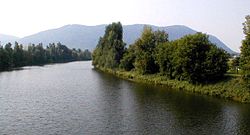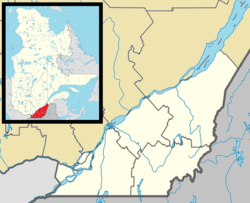Saint-Pie
Saint-Pie | |
|---|---|
 Riviere Noire | |
 Location within Les Maskoutains RCM | |
| Coordinates: 45°30′N 72°54′W / 45.500°N 72.900°W[1] | |
| Country | |
| Province | |
| Region | Montérégie |
| RCM | Les Maskoutains |
| Constituted | February 28, 2003 |
| Government | |
| • Mayor | Pierre St-Onge |
| • Federal riding | Saint-Hyacinthe—Bagot |
| • Prov. riding | Saint-Hyacinthe |
| Area | |
• Total | 108.60 km2 (41.93 sq mi) |
| • Land | 107.42 km2 (41.48 sq mi) |
| Population | |
• Total | 5,847 |
| • Density | 54.4/km2 (141/sq mi) |
| • Pop (2016-2021) | |
| • Dwellings | 2,511 |
| Time zone | UTC−5 (EST) |
| • Summer (DST) | UTC−4 (EDT) |
| Postal code(s) | |
| Area code(s) | 450 and 579 |
| Highways | |
| Website | www |
Saint-Pie (French pronunciation: [sɛ̃ pi]) is a city in the Montérégie region of southwest Quebec. The population as of the Canada 2021 Census was 5,847. Saint-Pie is best known for its furniture industry. It is also sometimes nicknamed the “Furniture Capital of Quebec”. The city is named after Pope Pius V, pope from 1566 to 1572, notable for his role in the Council of Trent, the Counter-Reformation, and the standardization of the Roman Rite within the Latin Church, known as Tridentine mass.[1]
The former parish municipality of Saint-Pie was amalgamated into the City of Saint-Pie on February 28, 2003.
Demographics
| Year | Pop. | ±% |
|---|---|---|
| 1911 | 768 | — |
| 1921 | 960 | +25.0% |
| 1931 | 858 | −10.6% |
| 1941 | 1,009 | +17.6% |
| 1951 | 1,182 | +17.1% |
| 1956 | 1,228 | +3.9% |
| 1961 | 1,434 | +16.8% |
| 1966 | 1,652 | +15.2% |
| 1971 | 1,709 | +3.5% |
| 1976 | 1,720 | +0.6% |
| 1981 | 1,725 | +0.3% |
| 1986 | 1,739 | +0.8% |
| 1991 | 2,083 | +19.8% |
| 1996 | 2,249 | +8.0% |
| 2001 | 2,396 | +6.5% |
| 2006 | 5,109 | +113.2% |
| 2011 | 5,438 | +6.4% |
| 2016 | 5,607 | +3.1% |
| 2021 | 5,847 | +4.3% |
(M) merger with Parish of Saint-Pie on February 28, 2003. | ||
In the 2021 Census of Population conducted by Statistics Canada, Saint-Pie had a population of 5,847 living in 2,413 of its 2,511 total private dwellings, a change of 4.3% from its 2016 population of 5,607. With a land area of 107.42 km2 (41.48 sq mi), it had a population density of 54.4/km2 (141.0/sq mi) in 2021.[6]
| 2021 | 2016 | 2011 | |
|---|---|---|---|
| Population | 5,847 (+4.3% from 2016) | 5,607 (+3.1% from 2011) | 5,438 (+6.4% from 2006) |
| Land area | 107.42 km2 (41.48 sq mi) | 107.49 km2 (41.50 sq mi) | 109.03 km2 (42.10 sq mi) |
| Population density | 54.4/km2 (141/sq mi) | 52.2/km2 (135/sq mi) | 49.9/km2 (129/sq mi) |
| Median age | 40 (M: 40.4, F: 39.6) | 39.4 (M: 40.1, F: 38.7) | 38.8 (M: 39.1, F: 38.4) |
| Private dwellings | 2,415 (total) | 2,475 (total) | 2,319 (total) |
| Median household income | $63,232 | $53,639 |
| Canada Census Mother Tongue - Saint-Pie, Quebec[5] | ||||||||||||||||||
|---|---|---|---|---|---|---|---|---|---|---|---|---|---|---|---|---|---|---|
| Census | Total | French |
English |
French & English |
Other | |||||||||||||
| Year | Responses | Count | Trend | Pop % | Count | Trend | Pop % | Count | Trend | Pop % | Count | Trend | Pop % | |||||
2021 |
5,845 |
5,645 | 96.6% | 45 | 0.8% | 40 | 0.7% | 110 | 1.9% | |||||||||
2016 |
5,605 |
5,465 | 97.5% | 30 | 0.5% | 15 | 0.3% | 75 | 1.3% | |||||||||
2011 |
5,395 |
5,315 | 98.5% | 30 | 0.6% | 15 | 0.3% | 35 | 0.7% | |||||||||
2006 |
5,090 |
4,985 | 97.9% | 80 | 1.6% | 10 | 0.2% | 15 | 0.3% | |||||||||
2001 |
2,360 |
2,335 | 98.9% | 15 | 0.6% | 0 | 0.0% | 10 | 0.4% | |||||||||
1996 |
2,235 |
2,185 | n/a | 97.8% | 15 | n/a | 0.7% | 10 | n/a | 0.5% | 25 | n/a | 1.1% | |||||
See also
References
- ^ a b "Banque de noms de lieux du Québec: Reference number 362829". toponymie.gouv.qc.ca (in French). Commission de toponymie du Québec.
- ^ a b Ministère des Affaires municipales, des Régions et de l'Occupation du territoire: Saint-Pie
- ^ Parliament of Canada Federal Riding History: SAINT-HYACINTHE--BAGOT (Quebec)
- ^ a b c "2021 Community Profiles". 2021 Canadian census. Statistics Canada. February 4, 2022. Retrieved 2022-04-27.
- ^ a b Statistics Canada: 1996, 2001, 2006, 2011, 2016, 2021 census
- ^ "Population and dwelling counts: Canada, provinces and territories, and census subdivisions (municipalities), Quebec". Statistics Canada. February 9, 2022. Retrieved August 29, 2022.
- ^ "2016 Community Profiles". 2016 Canadian census. Statistics Canada. August 12, 2021. Retrieved 2024-01-22.
- ^ "2011 Community Profiles". 2011 Canadian census. Statistics Canada. March 21, 2019. Retrieved 2014-03-15.
- ^ "2006 Community Profiles". 2006 Canadian census. Statistics Canada. August 20, 2019.
- ^ "2001 Community Profiles". 2001 Canadian census. Statistics Canada. July 18, 2021.
External links

